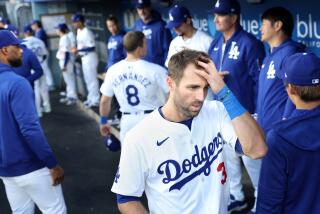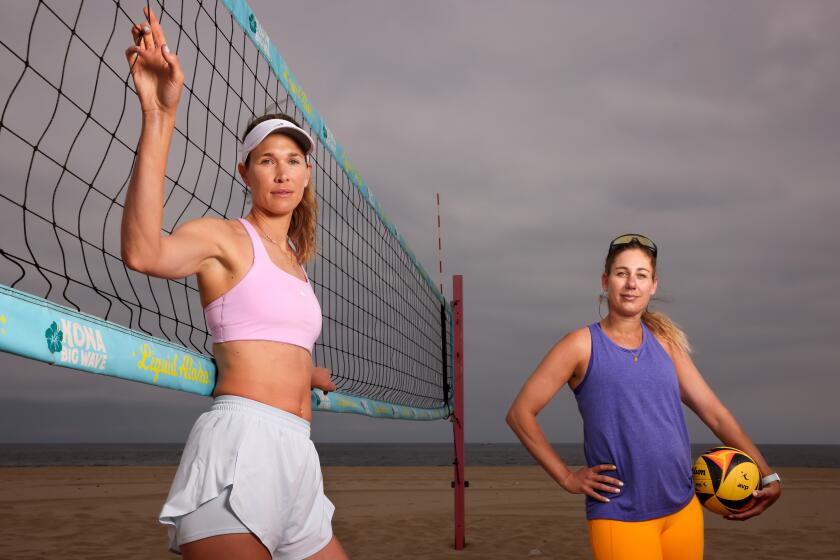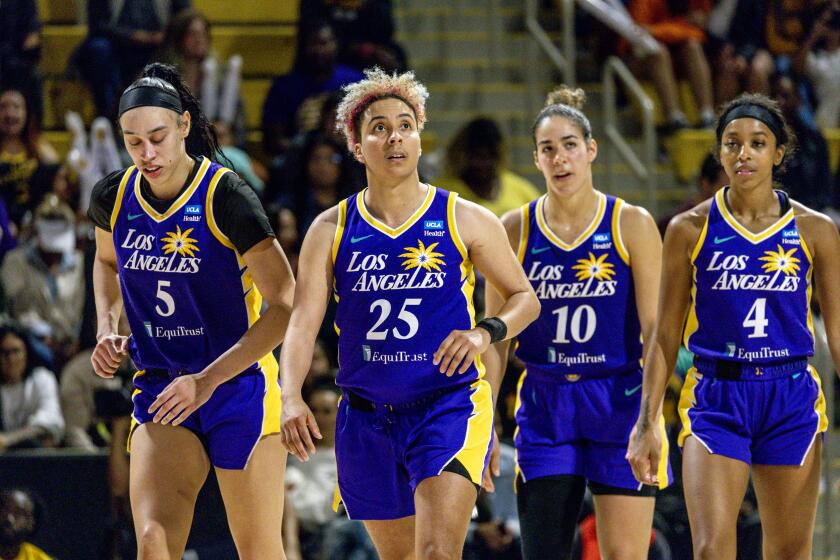Budke Makes a Trip From Champion to Hacker and Back : Golf: She won the U.S. Women’s Amateur but gave up tournament play for medicine. When she came back, her game was gone--until recently.
Mired in the slump that had stolen her game several years ago, Mary Budke pressed for answers.
To relieve the pressure, she agreed to play a round of golf with two friends, neither of whom knew her background as a former U.S. Amateur and national intercollegiate champion and winner of eight Oregon Amateur titles in nine years. It didn’t matter.
“I teed off and hit the ball two fairways to the right,” Budke said. “Then I hit it way to the left. I played terrible. It was embarrassing. When we finished, one of the guys said, ‘Hey, you have a nice swing. With practice you could be good.’ ”
Mary Budke had been good, very good.
“She was probably one of the top five or 10 amateur golfers who ever played the game,” former PGA Tour professional Jeff Sanders said. “She was unbelievable.”
Then, she was unbelievably bad. For years, Budke, who once shot a 68, “couldn’t break 90.”
“I was (a hacker),” she said. “I would start out with 10 golf balls, and by the sixth hole I’d have none left. I’d have to leave the course.”
In golf circles, Budke, 37, is an enigma. A can’t-miss LPGA tour prospect who finished 17th as an amateur in the 1973 U.S. Women’s Open, she opted for medical school rather than professional golf. In 1979, after her eighth Oregon Amateur title, she abruptly quit golf.
The next year, after receiving her medical degree from the University of Oregon Health Sciences Center, Budke served an internship at St. Vincent Hospital and Medical Center in New York City. In 1982, she joined Los Angeles County-USC Medical Center as a resident in emergency medicine.
Budke loved it.
“I was up to my elbows in overdoses,” she said of her training. “I ate it up.”
Today, life has calmed somewhat for Budke, who works as an emergency physician at Granada Hills Community Hospital. Next month, she will be inducted into the Oregon Athletic Hall of Fame, joining former Heisman Trophy winner Terry Baker, former NFL quarterback Dan Fouts and the late world-class distance runner, Steve Prefontaine, among others.
And her competitive fire is glowing again. She won the 1990 Los Angeles City Women’s Championship and finished in a tie for fourth in the 1991 event.
Despite appearances, golf never came easily for Budke. “I was not a natural,” she said the other day at her South Pasadena home. “I really had to work hard.”
Born near Portland, Ore., in rural Dayton, she began playing the game at 8.
Later, at Dayton High School, Budke’s father coached the boys’ golf team, and his top player was the local tomboy, Mary Budke.
By 1967, she had qualified for her first Oregon Amateur but lost in the first round. Shortly after graduating from high school, Budke, the girls’ state high school champion, won her first Oregon Amateur title. She decided to enroll at Oregon State.
She won the U.S. Amateur in 1972; was a member of the U.S. World Cup team that same year; won the Oregon Amateur in 1972-74; played in the U.S. Women’s Open as an amateur in 1973-76; was named Oregon’s top amateur athlete in 1973; played on the U.S. Curtis Cup team in 1974; was national intercollegiate champion in 1974 and won the Pacific Northwest Amateur championship in 1976. Then she announced that she would enter medical school rather than turn professional.
The announcement surprised few of her friends and followers.
“The women’s tour never has held a fascination for me,” Budke, who won 32 consecutive amateur tournaments, said in a 1976 interview. “Perhaps if it had been a bigger thing when I was a kid, I would feel differently now. All I know is that playing golf week after week all year long does not appeal to me. I love golf but not that much.”
Part of the problem was her short game. A power hitter, Budke conceded that her putting and chipping were liabilities.
“I thought my talent was good enough to make the tour, but I really thought I’d be a mediocre tour player,” she said. “I never really enjoyed putting or chipping. And I had other interests.
“I’d play competitively for three weeks and I’d want to throw up.”
Another problem was that she set her sights on success as an amateur. During the 1960s and ‘70s many of the best female players were amateurs. After winning the U.S. Amateur as a college freshman, there was little left for her to accomplish.
“All my goals involved amateur golf; that’s what drove me,” she said. “Today, the best players are on the tour. Back then, the top 10 amateurs could compete with the top 10 pros. There wasn’t any depth on the tour. That’s changed dramatically over the years.”
Sanders, who was on the PGA Tour in 1980-85, played the amateur golf circuit in Oregon with Budke before turning pro. He remembers her as a tenacious, yet gracious, competitor who dominated her opponents.
“She was all-world,” said Sanders, who compared Budke with current pro Amy Alcott (whom Budke has beaten). “Without question, Mary would have been one of the leading money winners . . . on the LPGA tour.”
Kathy Young, on the LPGA tour since 1979, said Budke had “all the tools,” adding: “If she had decided to turn pro, she would have been fantastic.”
“She was the best I played against as an amateur,” Young said. “When you played against Mary, it was pretty much assured she would beat you and that you were playing for the runner-up spot.”
As a doctor, Budke has concentrated on emergency medicine because it gives her an opportunity to help people, and its predictable hours allows time for golf.
“It was a selfish decision,” Budke said. “I enjoy serving people, but there wasn’t this wonderful, altruistic contribution to society that I needed to fulfill. Besides, the income is a little more stable.”
She draws upon her tournament experiences daily.
“You perform under stress,” she said. “You perform when you have to. That’s the ultimate comparison. I feel far more comfortable doing what I do in the emergency room than I do on a golf course. I feel I had good (medical) training and that I can handle most situations.”
From 1979 through ‘86, Budke spent little time playing golf. “I played maybe a round every three months or so,” she said. And she usually played poorly.
Nonetheless, her desire to compete remained strong. Budke entered the 1985 Oregon Amateur tournament as the sentimental favorite, shooting a 38-59--97 in the final qualifying round. Discouraged, she nearly gave up the sport.
“I played a round with her at about that time, and it was a fright,” said Liz Cathcart, a teaching pro at Moraga Country Club near Oakland. “The poor thing, she had so much pressure on her.”
Budke offered a similar assessment of her game. “It was humiliating,” she said. “It was ugly.
“I’d play horribly. The next time I’d play, it would be just as bad. I’d end up in tears.”
Budke persisted. She took time off, played by herself and practiced on courses where no one knew her reputation. Finally, in May 1986, “something clicked.” That something involved her setup and pivot.
“I did something physically where my muscle memory said, ‘That’s what you’re supposed to do.’ ” she said. “A light came on.”
Budke failed to qualify for the 1987 California State Amateur Championship. The next year, she was eliminated in the first round of the Oregon Amateur. In 1988 and ‘89, she was runner-up in the California Amateur.
“Those (California) tournaments got my confidence up,” she said.
Budke was second in the 1989 Los Angeles City Women’s Championship. In 1990, she won the title. Eleven years after her last amateur victory, Budke had come full circle.
Her confidence high, Budke tried to qualify for the 1990 U.S. Amateur. She had a hole in one but missed qualifying by a stroke.
Budke has not ruled out another attempt to qualify for the U.S. Amateur--next year will mark two decades since she won the title at St. Louis Country Club--but she said: “My goals now are to have fun and to play golf at one level.”
Certainly, few golfers with Budke’s ability and background have stumbled as she did.
That, Budke said, is golf.
“I’ve lost count of the number of times I’ve embarrassed myself,” she said. “Golf never stops humiliating you. That’s the nature of the game.”
She paused, then added: “Medicine is humbling, too. If you’re honest, 50% of the time you say, ‘I don’t know.’ ”
More to Read
Get our high school sports newsletter
Prep Rally is devoted to the SoCal high school sports experience, bringing you scores, stories and a behind-the-scenes look at what makes prep sports so popular.
You may occasionally receive promotional content from the Los Angeles Times.






